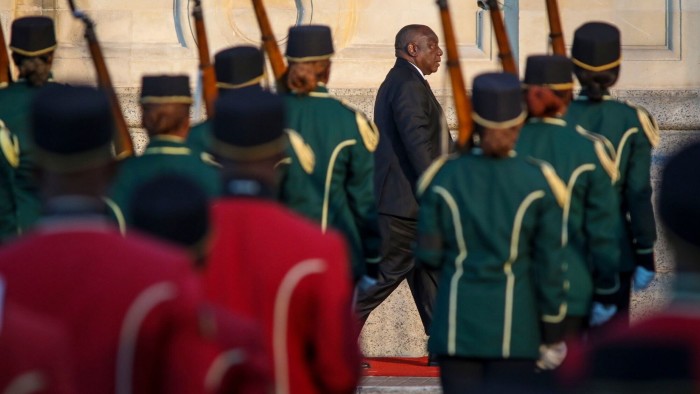Unlock the White House Watch newsletter for free
South Africa’s president, Cyril Ramaphosa, made headlines with his recent state of the nation address. Despite speaking for 90 minutes, it was his powerful declaration of “We will not be bullied” that resonated with the public. This statement was widely interpreted as a response to US President Donald Trump, who had criticized South Africa for its land expropriation policies and treatment of certain classes of people.
In a series of social media posts and executive orders, Trump accused South Africa of confiscating land and implementing discriminatory ownership laws. This criticism was further fueled by tech billionaire Elon Musk, who questioned the country’s Black empowerment legislation and labeled it as openly racist.
While South Africa has faced its fair share of criticism, particularly regarding the failures of the African National Congress policies, the focus on race in the recent attacks from Trump and Musk has raised eyebrows. The issue of land expropriation, in particular, has stirred controversy among white South Africans who fear the loss of their land. However, the historical context of apartheid and the ongoing economic disparities highlight the need for redress and transformation.
Despite the backlash, South Africa remains committed to its foreign policy decisions, including taking Israel to the International Court of Justice. The repercussions of Trump’s actions, such as cutting aid that impacts healthcare programs, are concerning for the country. Additionally, the potential loss of market access privileges under the US African Growth and Opportunity Act could have serious economic implications.
In response to these challenges, South Africa is seeking to de-escalate the situation and engage with the US administration to address misconceptions. While standing firm on its policies, the government is hopeful that dialogue and diplomacy will prevail. The country’s efforts to navigate this diplomatic storm reflect its commitment to stability and progress.
For more exclusive insights and analysis on global affairs, subscribe to the White House Watch newsletter for free. Stay informed and stay ahead of the curve with our in-depth coverage of international developments.
[Original article by David Pilling, source: Financial Times]








